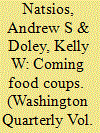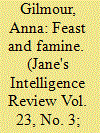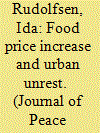| Srl | Item |
| 1 |
ID:
086329


|
|
|
|
|
| Publication |
2009.
|
| Summary/Abstract |
The doubling of grain prices over the past years has already set off violent protests in over 30 developing counteries and led to the overthrow to the Haitian prime minister Jacques Edouard Alexis.Even though the media has provided extensive coverage and analysis of the causes of the increase in food prices, the potential political and security consequences have been given little attention.
|
|
|
|
|
|
|
|
|
|
|
|
|
|
|
|
| 2 |
ID:
103557


|
|
|
| 3 |
ID:
166446


|
|
|
|
|
| Summary/Abstract |
This study examines the linkages between energy price and food prices over the period 2000–2016 by using a Panel-VAR model in the case of eight Asian economies. Our results confirm that energy price (oil price) has a significant impact on food prices. According to the results of impulse response functions, agricultural food prices respond positively to any shock from oil prices. Our results show that there is a linkage between energy and food security through price volatility. Since inflation in oil price is harmful for food security, it would be necessary to diversify the energy consumption in this sector, from too much reliance on fossil fuels to an optimal combination of renewable and nonrenewable energy resources that will be in favor of not only the energy security by also the food security. In addition, the paper found that the impact of biofuel prices on food prices is statistically significant but explains less than 2% of the food price variance. However, by increasing the demand for biofuel, there should be more concern about the global increase in agricultural commodities prices and endangering food security, especially in vulnerable economies.
|
|
|
|
|
|
|
|
|
|
|
|
|
|
|
|
| 4 |
ID:
103522


|
|
|
| 5 |
ID:
178681


|
|
|
|
|
| Summary/Abstract |
Under what conditions do increasing food prices lead to urban unrest? Existing literature suggests a positive correlation between food prices and social unrest. Meanwhile, there is a large variation in the consequences of increasing food prices, indicating that this phenomenon has a heterogeneous effect across different contexts. The theoretical focus on grievances in the existing literature appears to be insufficient for explaining the variations in outcome. This study asks whether specific features in the domestic institutional setting can explain why food-price induced grievances sometimes lead to unrest and at other times do not. Specifically, the article argues that the manifestation of unrest when food prices increase is moderated by the degree to which the state represses societal organizations. Civil and political society have the potential to channel collective dissent around food-related grievances, as these organizations provide existing mobilization structures that people can draw on to engage in collective action. Further, they can translate an individual-level grievance into a group phenomenon by politicizing the cost of food through the formulation of grievance frames. If the state represses existing societal organizations that can help aggrieved individuals engage in collective action to voice discontent – or introduces barriers to initial mobilization – this will likely reduce the possibility of unrest when food prices go up. Using institutional data from the Varieties of Democracy (V-Dem) project combined with the Social Conflict Analysis Database (SCAD), the findings suggest that repression of societal organizations decreases the likelihood of unrest when food prices rise.
|
|
|
|
|
|
|
|
|
|
|
|
|
|
|
|
| 6 |
ID:
083857


|
|
|
| 7 |
ID:
125878


|
|
|
|
|
| Publication |
2013.
|
| Summary/Abstract |
The sharp increase in global food prices during 2007-2008 has triggered the awareness of food insecurity problems and their impacts on the low-income, food-deficient countries, many of which are located in East Asia. Protein and fat consumption are higher in East Asia than that of other regions, although the percentage of carbohydrates consumed is slightly lower than the world's average. Nevertheless, the food security situation in East Asia was good relative to other countries in the world. The food security in East Asia is largely contributed by domestic production. Despite of a doubled import of foods over the last decade to meet its ever-growing population, Asia remains the least dependent among all regions on food imports. However, the raised energy costs and grain prices due to increasing grain demand for biofuel purposes appeared to exacerbate the undernourishment of poor households in the region. While most of the government interventions focus on short-term measures such as reducing domestic food prices through trade or price control, the risk of facing a long-term food insecurity still exists, which may render national action inadequate and require multilateral cooperation.
|
|
|
|
|
|
|
|
|
|
|
|
|
|
|
|